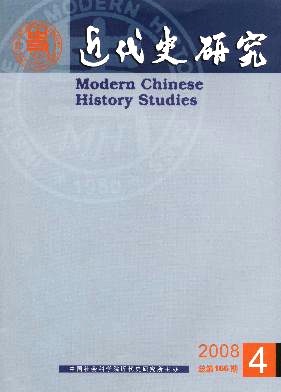《近代史研究》2008年第4期
2020-10-21 15:45:05 来源:中国社会科学院近代史研究所 点击:
一、中文目录
专题论文
中国古代专制说的知识考古 侯旭东(4)
同治、光绪年间广东首县的日常公务——从南海知县日记所见 邱 捷(29)
论清季学堂奖励出身制 左玉河(45)
大灾荒与贸易(1867—1931)——以天津口岸为中心 佳宏伟(58)
新县制“政教合一”的演进和背景 曹天忠(74)
20世纪三四十年代湖北省沿江地区帮会 尹恩子(92)
理想与现实:南京国民政府地方司法建设中的经费问题 吴 燕(107)
“跑调”的国货展览会:1935年无锡国货流动展览会研究 付海晏(125)
问题讨论
也论近代人口压力:冀中定县人地比例关系考 李金铮(139)
读史札记
此《花甲忆记》非彼《花甲忆记》:
丁韪良A Cycle of Cathay中译本勘误补正 王文兵(150)
学术综述
第五届中国灾害史学术研讨会综述 杨鹏程 杨湘容(159)
二、中文内容提要
中国古代专制说的知识考古 侯旭东(中国社会科学院历史研究所研究员)
[内容提要] 19世纪末以来,秦至清的帝制时代的中国政体为专制政体、皇帝为专制皇帝的论断影响广泛,流行不衰,并成为中国史研究的基本观点之一。本文从思想史的角度对这一说法产生、传播的历史及其后果加以分析,指出此一论断并非科学研究的结果,而是亚里斯多德以来的西方人对东方的偏见。18世纪时个别西方思想家开始以此来描述中国,19世纪末以后经由日本广为不同立场的中国知识分子所接受,并通过辞书与历史教科书渗透到大众中,罕有质疑者。这一说法实际未经充分的事实论证,不加反思地用它来认识帝制时代中国的统治机制只会妨碍研究的深入。
[关键词] 专制主义 专制政体 孟德斯鸠 明治维新 梁启超
同治、光绪年间广东首县的日常公务——从南海知县日记所见 邱 捷(中山大学历史系、历史人类学中心教授)
[内容提要]本文引用的主要资料是同治、光绪年间曾任南海知县的杜凤治的日记。杜凤治除了要执行一般州县官的公务之外,还是直接管辖省城的行政长官(广东省城分属南海、番禺两县管辖)。从日记记载我们可以了解清朝后期地方政府对省会城市的管理体制以及城市社会生活的很多细节。杜凤治被总督委派参与了大量“洋务”活动,日记记载了当时广东中外交涉的一些情况。此外,杜凤治作为首县知县,经常直接向督、抚、藩、臬报告,与各级上司讨论公务,参与官员任免等事务,实际上成为广东省高级官员的重要助手,日记对杜凤治与各级官员公私交往的记录,揭示了晚清地方行政机构的具体运作以及晚清官场的各种规则与人际关系。
[关键词]杜凤治日记 晚清 州县官 地方行政
论清季学堂奖励出身制 左玉河(中国社会科学院近代史研究所研究员)
[内容提要]科举制是古代中国之抡才制度,而新式学堂体制则是近代育才制度,两者在性质及功能上存在很大差异。清季科举制废除前后实行的学堂奖励出身制,将传统科举制之抡才制度与近代学堂之育才制度简单地作了错位嫁接。它实际上是传统的“学而优则仕”观念之延续,滋生并助长了“以学干禄”风气,强化了“官学一体化”格局,故受到有识之士的猛烈抨击。该文在考察清季学堂奖励出身之制度设计与具体实施情况基础上,分析科举与学堂在性质及功能上的差异,揭示“学堂与仕进混合”、“抡才与育才并一”之制度设计的内在冲突,进而说明从传统科名奖励制经过学堂奖励出身制之过渡,而转向现代学术奖励制度的复杂性与必然性。
[关键词]科举制 奖励出身 新式学堂 抡才 育才
大灾荒与贸易(1867-1931)--以天津口岸为中心 佳宏伟(厦门大学历史系讲师)
[内容提要] 本文希望着眼于具体的实践过程,关注于实践中未曾被表达的实践逻辑,转换分析视角,以天津口岸为中心,选取区域分析为切入点,通过考察区域灾荒与口岸贸易之间的内在关联性,验证区域结构在塑造口岸贸易演变中的重要性,以及开埠之后口岸贸易的本土发展逻辑。文章认为,灾害作为区域结构变动中的主要因素之一,直接影响着贸易结构和趋势的演变。长期以来,关于口岸贸易与区域社会之间的关系,学术界大多强调口岸贸易在塑造区域社会中的重要性,然而通过分析区域灾害与口岸贸易之间的内在关系,可知这种联系并非单向的。灾害作为区域结构变动中的重要因素之一,集中体现了区域社会在塑造口岸贸易演变中的作用力。“冲击-回应”、“帝国主义”、“传统与现代”等分析范式赋予西方如此大的作用力,而对于区域结构的作用力则估计不足,显然有待于进一步深刻反思。
[关键词]口岸贸易 天津 灾荒
新县制“政教合一”的演进和背景 曹天忠(中山大学
[内容提要]新县制中的政教合一,先后经历了政教合长、政教分长、政教相连的演进、冲突和调整。其中的焦点是政教合长中的一人兼三长,是以乡镇保长为主体,而以校长为兼职;还是以校长为主体,以乡镇保长为兼职的人事冲突。这在主观上与政教两界,包括掌控教育、内政两部的CC派与新政学系利益博弈相关;客观上则受经济水平以及社会综合与分工矛盾的制约,不宜简单以加强思想统制进行否定。这些一波三折的纠葛,揭示了理论上不成问题的政教关系,在近代中国的特定境遇下和实际运作中,大成问题的复杂面相。
[关键词]新县制 政教合一 CC派 新政学系 综合与分工
20世纪三四十年代湖北省沿江地区帮会 尹恩子(南京大学外国语学院副教授)
[内容提要] 湖北省位于中国中部,以长江和汉江为两大水运干线。近代以来,湖北省沿江地区商业城镇快速发展,并逐渐成为省内帮会的发展中心。南京国民政府成立以后,以汉口、宜昌等大城市为中心,湖北帮会进入大发展时期,其势力从城市码头渗透到周边农村地区。城镇帮会主导了周边农村地区帮会的扩散。农村社会由于长期的宗族械斗或者经济衰退,导致了农民、游民的帮会化、土匪化。抗战爆发后到内战结束前,由于国民党、共产党、侵华日军等不同政治派别的动员、利用,促进了湖北省帮会的空前膨胀。地方帮会的发展基于当时的政治、经济、社会环境之上,如果说地方经济、社会环境是帮会孳生的土壤,政治环境则常对其盛衰起决定性作用。
[关键词]民国时期 湖北沿江地区 帮会(汉流) 国民党 共产党
理想与现实:南京国民政府地方司法建设中的经费问题 吴 燕(电子科技大学政治与公共管理学院教授)
[内容提要] 南京国民政府成立后,最高司法当局一直勉力争取中央统一解决地方司法经费,1940年拟议多年的议案终于付诸实施。这一过程曲折迂回,起伏跌宕。统治者对司法建设的复杂认知,国家经济实力和战时环境,利益重新分割的矛盾,监督制度的落空,都对地方司法经费的划拨和使用形成窒碍,最终使划拨经费的预期目的没有达到。
[关键词]司法行政部 司法经费 司法收入
“跑调”的国货展览会:1935年无锡国货流动展览会研究 付海晏(华中师范大学中国近代史研究所副教授)
[内容提要]近代国货运动在拓展国货市场、发展民族经济、抵制外来经济侵略等方面具有重要意义。然而,1930年代,在经济危机与企业生存压力下,某些国货展览会的重点不是宣传、改良、劝用国货而是逐渐变成了倾销国货,尤其是在内地县城或乡村举办流动展览会时,国货团体、国货厂商甚至一般商人等主办者往往采取廉价竞卖的倾销手段,从而酿成国货运动中的国货展览会、国货厂商与地方各业之商业竞争,各地反对国货展览会和国货商场的风潮亦频频发生。本文以1935年上海市国货推行协会在无锡举办的国货流动展览会为中心,研究了国货流动展览会中的“跑调”现象,初步展现了国货运动中的复杂面相。
[关键词] 国货展览会 上海市国货推行协会 无锡
也论近代人口压力:冀中定县人地比例关系考 李金铮(南开大学历史学院、中国社会史研究中心教授)
[内容提要]关于清代和民国时期的人地比例关系,学界普遍认为人口对土地压力越来越大,乃至无法维持最低限度的生活,只有少数学者模糊地提出并非像以往所说的那样严重。其实,探讨人口压力问题的关键是人地比例临界点的确定。以往对此多有估计,按照这些标准衡量,现有耕地的确严重不足。但遗憾的是,大多并未论及计算方法,不知根据何来。近代冀中定县的个案研究显示,人地比例关系处于愈益紧张之势,但人地比例关系紧张并不意味着现有耕地就已经到了不能维持农民最低限度生活的地步。根据民间流行的消费观念和实地调查资料,可以对人地比例临界点做出比较精确的计算,由此得出的结论是:从维持最低粮食消费角度看,现有耕地能够满足人口需求;从维持最低限度生活消费角度看,虽有不足,但相差不远。进一步言之,近代农民生活的贫困主要不是因为人口压力,而应当从其他方面寻找。
[关键词]定县 人口压力 人地比例 消费水平
此《花甲忆记》非彼《花甲忆记》:丁韪良A Cycle of Cathay中译本勘误补正 王文兵(天津财经大学珠江学院讲师)
[内容提要]本文系对丁韪良A Cycle of Cathay中译本(《花甲忆记——一位美国传教士眼中的晚清帝国》)的批评。本文从A Cycle of Cathay与1910年版《花甲忆记》的关系、回译、误译几个方面对中译本存在的不足进行了讨论并纠正,此外对带1905年序的A Cycle of Cathay的第三版存在与否问题作了澄清说明。
[关键词]丁韪良 W. A. P. Martin A Cycle of Cathay 《花甲忆记》
第五届中国灾害史学术研讨会综述 杨鹏程 杨湘容
三、英文内容提要
Modern Chinese History Studies 2008, No.4
An Intellectual History of the Ancient Chinese Despotism Thesis / Hou Xudong (4)
Since late 19th century, the thesis that the imperial Chinese polity from Qin to Qing was despotic and that Chinese emperors were despots has been popular and influential. Indeed, it has constituted one of the basic theses employed in studies of Chinese history. This paper looks at this thesis from the angle of intellectual history, analyzing its emergence, its spread and its consequences. The paper points out that this thesis was not a result of scientific research, but a Western bias towards the Orient dating to Aristotle that a few Western thinkers began to use in the 18th century to describe
Official Duties of the Magistrate of Guangdong’s Foremost County during the Tongzhi and Guangxu Periods: Reading the Nanhai County Magistrate’s Diaries / Qiu Jie (29)
The main data used in this article are the diaries of Du Fengzhi, who was magistrate of Nanhai county during the Tongzhi and Guangxu periods. In addition to performing the routine official duties of a prefect or magistrate, Du Fengzhi was also the official in direct control of
On the System of Awarding Degrees in Schools in the Qing Dynasty / Zuo Yuhe (45)
The imperial examination system was a system for selecting talented persons in ancient
Famine and Foreign Trade: Centered on the
This article seeks to validate the importance of regional structure in molding the evolution of foreign trade, and studies the native developmental logic of foreign trade after the opening of the ports. The author hopes to do this by, on the one hand, focusing on concrete practical processes and drawing attention to practical logics that were not expressed in practices, and, on the other hand, by changing the angle of analysis by selecting a regional analysis centered on Tianjin as a starting point to explore the inherent linkage between regional famine and foreign trade. The article argues that, as one of the main factors affecting changes in the regional structure, disasters directly affected both the evolution of the structure and trends in trade. As for the relationship between foreign trade and regional social disasters, for a long time academics have mainly emphasized the importance of foreign trade in molding regional society. However, analysis of the inherent links between regional disasters and foreign trade shows that these links are not unilateral. As one of the important factors in regional structure, disasters embody an acting force in regional society, and shape the evolution of foreign trade. The analytical frameworks of “impact-response,” “imperialism” and “tradition vs. modernity” acknowledge the West as an acting force, but do not give enough credit to regional structure as an acting force. This obviously needs further re-consideration.
The Evolution and Background of the “Integration of Education and Politics” in the New
The integration of education and politics in the New County Organization System underwent successive processes of evolution, conflict and adjustment as education and politics passed through phases of combination, separation, and joining hands. The crux of the process was during the phase of “combining education and politics,” when the three positions of village (town) headman, Bao head and school headmaster were held by one person. The main problem was a personnel conflict: should the leader treat village headman and Bao head as his main positions, with school headmaster as concurrent post? Or should he treat school headmaster as his main position, with village headman and Bao head as concurrent posts? Subjectively, the “integration of education and politics” was related to a conflict of interests between political and education circles, including that between the CC Faction in control of the ministries of Education and Interior Affairs, and the New Political Sciences Faction. Objectively, it was confined by economic level, and by contradictions between social synthesis and the division of labor. We can not simply condemn it by saying that its aim was to strengthen thought control. These tortured disputes show that the relationship between education and politics, which theoretically should be non-problematic, had complex dimensions in modern
Secret Societies along the
Ideal and Reality: Spending in the
An “Out of Tune” Fair: A Study of the 1935
Fu Haiyan (125)
Modern Population Pressure Revisited: The Appropriate Ratio of Land to People in
Not the Cycle of Cathay that We Know: Corrections and Supplements to the Chinese Version of W. A. P. Martin’s A Cycle of Cathay / Wang Wenbing (150)
Summary of the Fifth Seminar on “the History of Disasters in
责任编辑:国强 最后更新:2021-05-30 19:48:27
特别说明:抗日战争纪念网是一个记录和研究中国人民抗日战争历史的公益网站。本网注明稿件来源为其他媒体与网站的文/ 图等稿件均为转载稿,本网转载,并不意味着赞同其观点或证实其内容的真实性。本网转载出于非商业性的文化交流和科研之目的,如转载稿侵犯了您的版权,请告知本网及时撤除。以史实为镜鉴,揭侵略之罪恶;颂英烈之功勋,弘抗战之精神。我们要铭记抗战历史,弘扬抗战精神,坚定理想信念,为国家富强、民族复兴,实现伟大的中国梦作出新的贡献。感谢您对抗日战争纪念网的支持。
纠错电话:0731-85531328、19118928111(微信同号)
上一篇:《近代史研究》2008年第3期
下一篇:《近代史研究》2008年第5期

 湘公网安备43010402000821号
湘公网安备43010402000821号